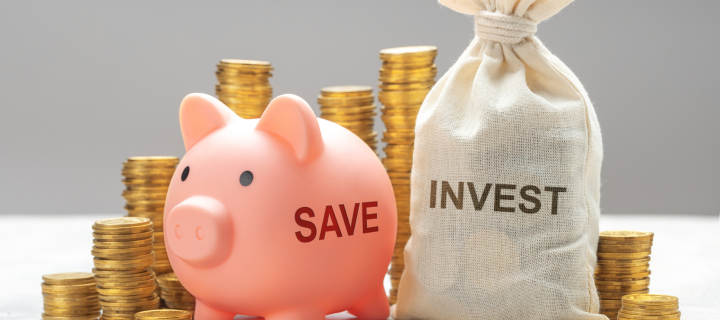
A common question we’re asked is, “Should I save or invest?”. The answer will depend on both your financial situation and your personal objectives. As savings and investments offer different strategies, we look at the differences so you can choose the right approach for you.
How much should I save?
Let’s start with savings. Many people assume they need a lot of money to make their savings worthwhile, but this isn’t necessarily the case. Some people start saving with as little as £10 per week, which is the same cost as a bottle of wine. However, when you calculate this amount over a 10-year period, this small sum will add up to £5,200.
There are different ways to save cash, and you will need to decide on how quickly you need to access your money. As a general rule, if you’ll need access to your money within the next 5 years, then a savings strategy could be the solution. However, the problem with cash savings is that money struggles to keep up with inflation and the cost of living. So, the value of your cash savings could fall in real monetary terms.
What are the different ways to save?
Below are three useful ways to save:
- Regular savings account – some banks provide high interest rates on savings when you commit to paying a regular sum each month. Typically, you will be expected to save between £50 and £300 per month. There might be different conditions relating to access to cash and you’ll need to make sure you don’t exceed your annual personal allowance. Otherwise, you might have to start paying tax (see next point).
- Fixed-rate savings account – if you’re happy to lock your cash away for a few years, you will generally get a higher interest rate on your savings. But when you keep your cash savings in a standard account, you may have to pay tax on any interest. For basic-rate taxpayers, your personal savings allowance is £1,000, and this reduces to £500 for higher-rate taxpayers.
- Cash ISA (individual savings account) – this enables you to save up to £20,000 per year tax-free. So, you won’t have to pay income tax on either your savings or any interest earned. Similar to fixed rate savings accounts, you can find some attractive ISA interest rates depending on how quickly you want access to your cash. If you’re already paying tax on your savings, then it’s worth considering opening an ISA.
How much should I invest?
As a general rule, you should never invest more than you can afford to lose. When it comes to investing, this requires more of a long-term approach. Suitable for those who are willing to lock their money away for 5 – 10 years, your money may be spread across different funds.
What are the different ways to invest?
Below are examples of the different types of investment:
- Shares – this is where you buy part of a company in exchange for a share in how it performs. Different companies are bought and sold, and trading is live on a stock exchange.
- Funds – this is where investors give their money to a fund manager. They invest the money, selecting investments based on the fund’s objectives. The aim is to grow the money over time, produce an income, or a mix of both. There’s usually a fee to own a ‘unit’ in a fund in exchange for the fund manager’s role in managing the money.
- Bonds – these are issued by governments or companies as a way of helping them to self-finance. In simple terms, you buy part of their debt in exchange of a future interest payment, as well as getting your money back at the end.
- Property – often called ‘real estate’, this is where money is invested into property, which is usually commercial rather than residential.
As a general guide, the more diverse your portfolio, the more resilient you should be to market shocks, depending on the investment products.
So, is it better to save or invest?
The short answer is yes to both. With current geopolitical events creating global market shocks, a combination of savings and investments ensures resilience. However, your financial plan will depend entirely on your personal circumstances.
A smart strategy for investing is to take a passive approach. At Balance: Wealth Planning, our financial planners divide your money into different ‘buckets’. A short-term bucket gives you access to your money, which is invested in cash or low-risk assets, while the medium-term bucket takes on more risk. The long-term money bucket is focused on investing for growth. The money in this pot will have more time to recover from market shocks.

The above model offers a savings and investment approach, giving you access to money and the reassurance you need to enjoy living your life.
Wealth Management, Nottingham
When it comes to creating a robust and sensible savings and investments strategy, it’s important to make informed decisions. Decide on how you wish to use your money in the short and long term, and how much access to cash you will need.
At Balance: Wealth Planning, our calm approach will give you the clarity you need to choose the right strategy for your wealth management. We have our own range of portfolios that are low-cost, well diversified and offer consistent performance. If you are interested in responsible investing, then we also have our own Good Practice Portfolios.
For advice on savings or investments, get in touch with our financial planners.
Sources:
https://www.moneysavingexpert.com/savings/savings-accounts-best-interest/
https://www.moneysavingexpert.com/savings/which-saving-account/
https://www.gov.uk/apply-tax-free-interest-on-savings
https://vimeo.com/manage/videos/1075676291

